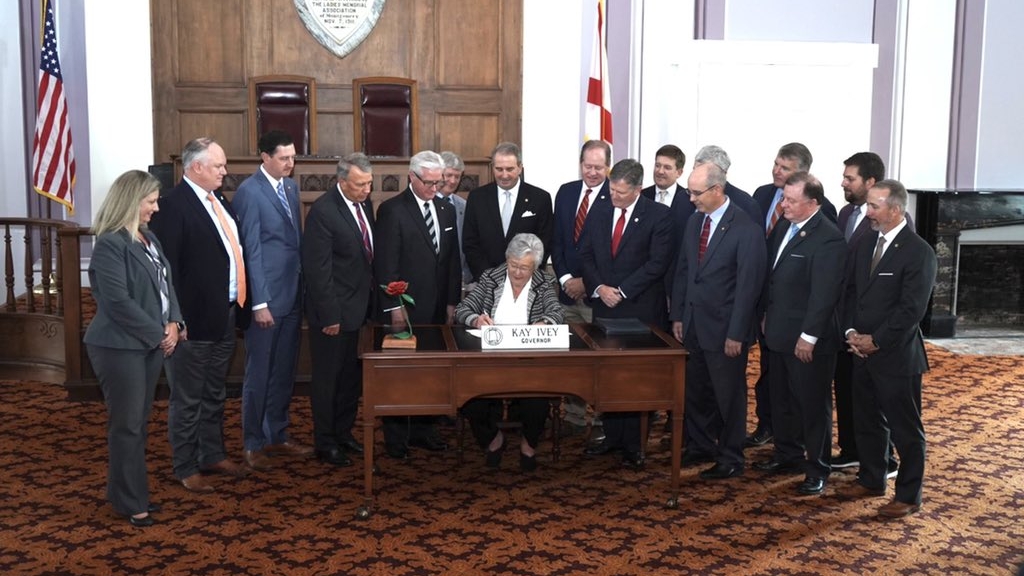Governor Kay Ivey on Friday signed into law a $1.3 billion prison construction package, which state lawmakers passed earlier in the day.
“Folks, this is a pivotal moment for the trajectory of our stage criminal justice system,” Ivey said just before the ceremonial signing. “For several years we have worked to address Alabama’s long standing prison infrastructure challenges. These challenges were decades in the making.”
“Achieving an Alabama solution to our problems rather than a federal court mandate was paramount,” Ivey said.
Critics of the plan who spoke of their concerns during the weeklong special session said new prisons alone won’t address the concerns laid out in a lawsuit against the state by the U.S. Department of Justice, which argues Alabama’s prisons for men are plagued with systemic problems of violence, sexual assaults, drugs and corruption.
Ivey placed two relatively minor sentencing reform bills in her proclamation calling for the special session, which limited what bills lawmakers could debate, but only one of those two bills made it to final votes in both the House and Senate.
Republican opposition in the Senate killed a bill that would have impacted certain incarcerated people sentenced before the presumptive sentencing guideline changes in 2013 by allowing them to file for re-sentencing under the current presumptive sentencing guidelines, which could result in a reduction in their sentences. The Alabama Sentencing Commission has said the bill could have impacted approximately 700 incarcerated people convicted of non-violent crimes.
Ivey at Friday’s ceremony didn’t sign the reform bill that successfully made it through the special session. House Bill 2 will increase the number of incarcerated individuals required to be released and supervised prior to the end of their sentence. The bill makes a 2015 law retroactive for those convicted before the 2015 law was enacted.
“Let me be clear. While more reform of the system can and does need to be addressed in the future, I am committed to that and so is the Legislature,” Ivey said before the signing ceremony.
House Ways and Means General Fund Committee Chairman Steve Clouse, R-Ozark, said at the signing ceremony that the action by the Legislature this week “is a win, win, win situation for the state of Alabama,” adding the legislation will save the state money, improve public safety and will begin to get the state in compliance with the U.S. Department of Justice.
“I’m very proud of the Alabama Legislature today,” said House Speaker Mac McCutcheon, R-Monrovia, speaking at the ceremony.
The U.S. Department of Justice in the federal government’s lawsuit alleged unconstitutional treatment of incarcerated men, including a lack of basic health care and mental health care in understaffed and deadly facilities.
In previously released reports, the Justice Department detailed systemic problems of abuse from guards, corruption, rampant drug use, violence, overcrowding and understaffing in Alabama’s prisons. The DOJ in those reports states that while new prison facilities might help in some areas, new buildings won’t fully address the state’s widespread, deadly problems in its prisons.
The Senate earlier on Friday approved the amended bill in a 29-2 vote, with Sen. Billy Beasley, D-Clayton, and Sen. Arthur Orr, R-Decatur, voting no. Beasley filibustered the bill in the Senate and failed to get approval for his amendment, which would have shrunk the planned two new prisons for men in Elmore and Escambia counties from 4,000 beds each to 3,000 beds.
House members without debate voted 74-22 Friday afternoon to concur with the Senate’s amended version of House Bill 4, which allows the state to borrow up to $785 million in bond issuances to construct two new prisons and renovate existing prisons. An amendment in the Senate removed the Hamilton Aged and Infirmed prison from a list of five to be closed once the new prisons are constructed.
The Senate earlier on Friday approved House Bill 5, which will allocate $400 million in federal COVID aid through the American Rescue Plan to be used toward prison construction.
House Bill allows the state to spend as much as $154 million of the state’s general fund money to go toward those prison construction costs, in addition to allocating $19 million from the state’s General Fund to buy the empty Perry County Correctional Facility in Uniontown from the private prison company Geo Group, to be used by the Alabama Bureau of Pardons and Paroles to house parolees and probationers who violate the terms of their release on technical matters but didn’t commit new crimes.
The Senate earlier on Friday approved House Bill 5, which will allocate $400 million in federal COVID aid through the American Rescue Plan to be used towards prison construction.




















































